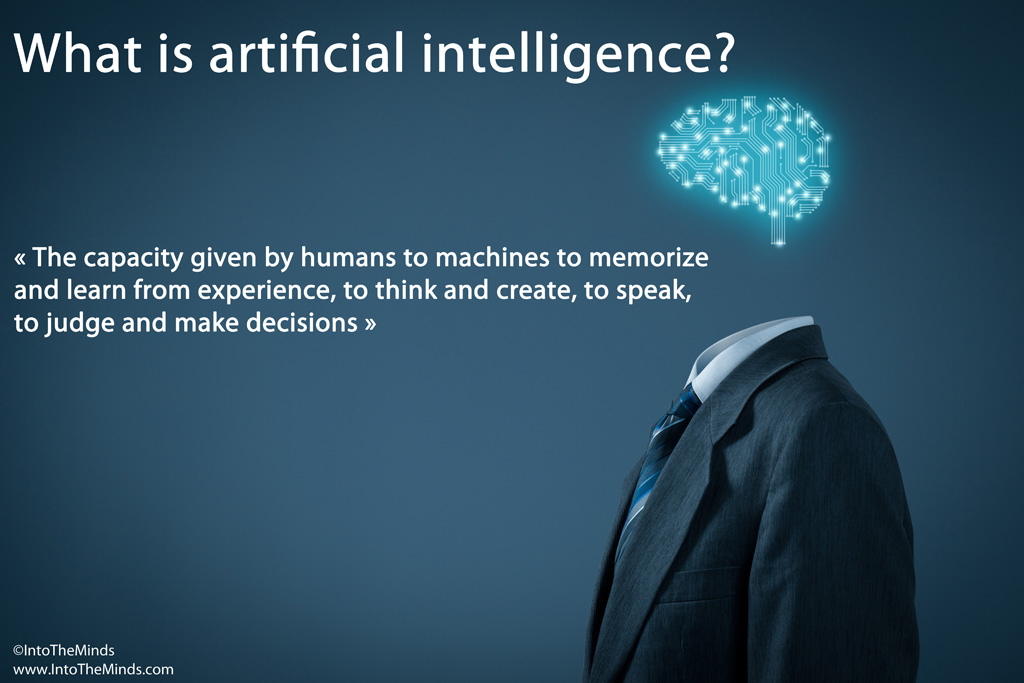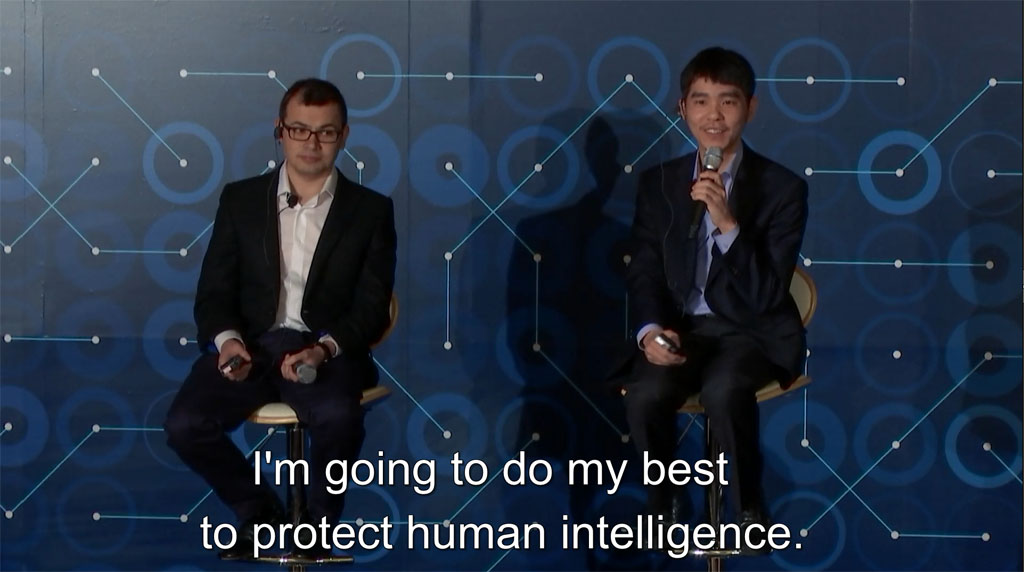I’m often asked to answer the following question : “what is artificial intelligence”. When faced with such a question there is a temptation to immediately give a technical explication which will confuse your interlocutor even more.
In today’s article I chose to answer that difficult question in a simple way. To reach this objective I chose to first define human intelligence before characterizing artificial intelligence. Even with this simple approach I found it difficult to nail it. At the end of the article (make sure you scroll down) I’ll be explaining why I think algorithms are useful to “expend our humanity” and will introduce the concept of “computer serendipity”.
Table of contents
- what is intelligence?
- what is artificial intelligence?
- there is no artificial intelligence yet
- what’s the point with artificial intelligence?
What is intelligence ?
To answer this question I propose we first define what is (human) intelligence. Intelligence is
‘the ability to think, reason, and understand instead of doing things automatically or by instinct’ (source: collins dictionnary)
I particularly like this other definition of intelligence by Jeff Schweitzer :
“Intelligence can be thought of as the ability to learn from experience (acquire and retain new knowledge), and to subsequently apply that new knowledge with flexibility to manipulate or adapt to a changing environment. Or intelligence can be seen as the ability to create abstract thought, beyond instinct or responses to sensory input.”
Neel Burton proposes to define intelligence by its opposite, dementia. He writes :
“In Alzheimer’s disease, the most common form of dementia, there is disturbance of multiple higher cortical functions including memory, thinking, orientation, comprehension, calculation, learning capacity, language, and judgement”. Intelligence would therefore be the opposite of all that.
Summing up the various definitions, intelligence could be briefly (and very icompletely) defined as :
- the ability to memorize and learn from experience
- the capacity to think and to be creative
- the ability to speak
- the capacity to judge and make decisions
Intelligence can also be more than just those factual abilities, the absence of which defines dementia. Feeling emotions is certainly also what makes us intelligent beings (don’t we speak of “emotional intelligence” and emotional IQ?) . But I think we’ll leave it aside for the moment and will just focus on the most obvious aspects.
What is artificial intelligence ?
The Oxford dictionnary defines the adjective “artificial” as follows : “Made or produced by human beings rather than occurring naturally, especially as a copy of something natural.”.
Artificial intelligence is therefore a copy of human intelligence. It aims at reproducing the human brain’s functions. Artificial intelligence, it follows, is the capacity given by humans to machines to memorize and learn from experience, to think and create, to speak, to judge and make decisions.
Mimicking the functioning of the brain may seem as a unsurmountable challenge. The human brain, shaped by millions of years of evolution, is an incredibly efficient machine. It’s able to process up to 10^17-10^18 operations per second at a cost of 25W while the best GPU cards can process 10^9 – 10^10 at a cost of 250W. It’s 100m less and 10 times more energy. When Alpha Go defeated Lee Sedol, Alpha Go had trained millions of times against a copy of itself, more than all games played by mankind in the last 3000 years. And yet, Leee Sedol was able to win a game (the 4th one).
The very process of creating an artificial intelligence is anchored in the observation of how the human brain works. For instance convolutional networks (used for instance to program Alpha Go) were inspired by the observation of how visual cortex works. Convolutional neural network have been around since the 90’s but found real life applications only when processing and storage became cheaper, in the last decade or so.
There is no such think as artificial intelligence … yet
The big hurdle to make artificial intelligence happen is to bridge the cap between recognition and cognition.
So-called artificial intelligence is today capable of recognition; not cognition. Machines operates within the limits set by their designers or within the limits of the datasets they are fed with. Consider these few examples :
- 100m images are needed to reach 98% reliability for image recognition ; yet it takes only 2 images for a baby to learn that difference
- biased datasets lead to biased results consider for instance the work by Joy Buolamwini on biased datasets)
- vocal assistants‘ answers are based on scripts defined by humans
In short, deep-learning makes it possible to train machines on the task to “recognize”. But there are still no technical possibilities to develop an artificial common sense, something that is an integrate part of your human nature. While toddlers can learn rapidly from a few examples, it takes machines massive databases to achieve non-perfect results.
Lee Sedol during the press conference before the 1st of the 5 games against Alpha Go (screen capture from the movie AlphaGo)
What’s the point with artificial intelligence then?
While artificial intelligence may seem purely imitational by nature, technology can also be a springboard for fundamental research. In a 2017 interview, Yann Le Cun (the Director of the Facebook Labs) explained that technological innovation sometimes drives fundamental research in one particular area. For example the telescope, invented in the 16th century, made it possible to study astronomy and optics; planes gave a boost to the study of aerodynamics.
In the end (and I think that’s a very important for those who fear machines will replace them) I think there’s many more advances to make through the combination of human intelligence and artificial intelligence.
In the press conference before the first of the 5 games, Lee Sedol declared he wanted to “protect human intelligence”. In other words he saw the 5 games as a fight between man and machine. After the 5th game (which he lost against Alpha Go), Lee Sedol said he had learned a lot from the games he lost because the machine had “invented” some moves that hadn’t played by Humans before (for example the famous “move 37” whch specialists found so creative). This is where artificial intelligence can play a role. A machine, a computer program, can explore all existing possibilities without without getting tired or being bored, allowing us sometimes to discover something new. Let’s call this computer serendipity, in other words an ability to explore systematically what humans may have ignored or forgotten. Maybe movement 37 had been played by someone 2000 years ago but no record has been kept of it. The observation period is just too long to remember and this is where algorithms can be useful, by quickly exploring, over a reasonable period of time, all the solutions to a given problem.
The machine can therefore in a way allow us to overcome our humanity.
In a sense machines can therefore help us expend our humanity.
Posted in Innovation.

